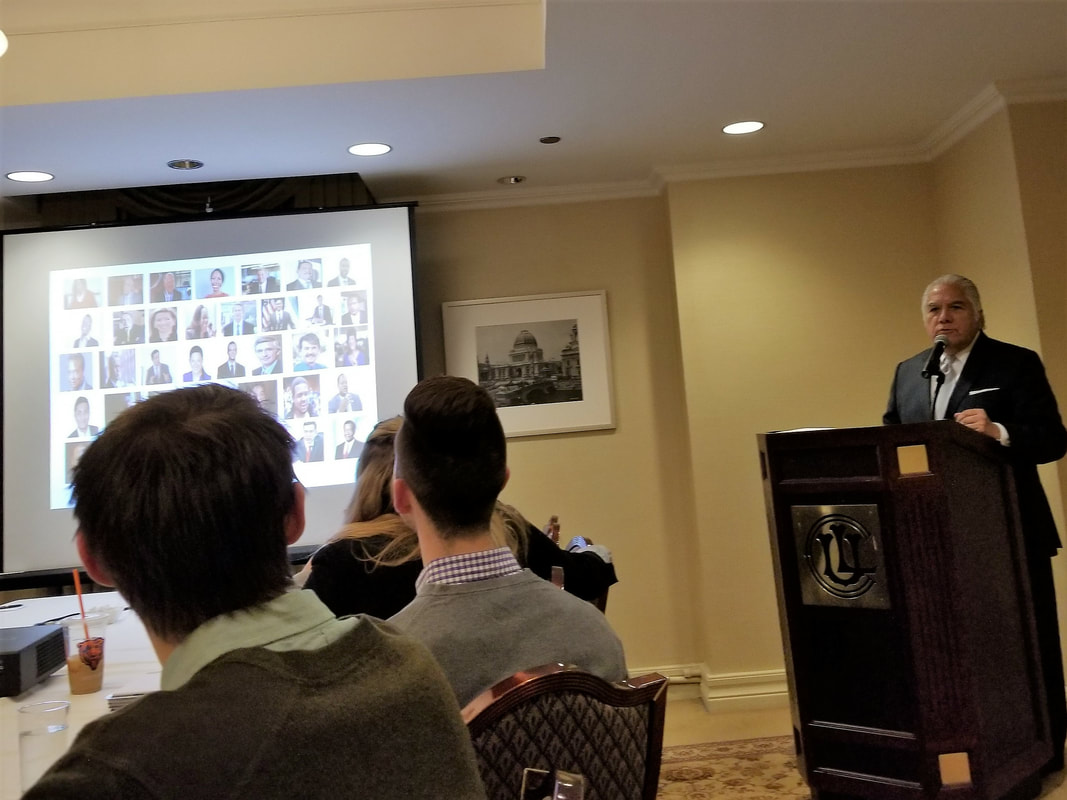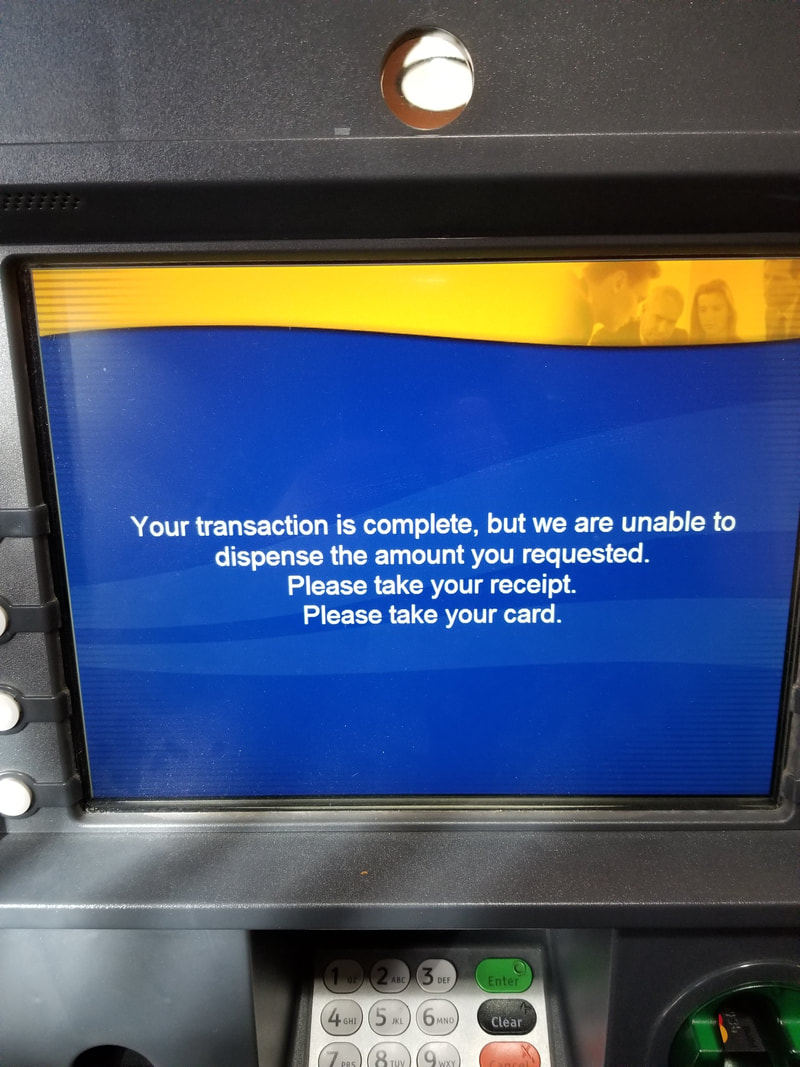|
Photo Credit: Alicia Dale I had the occasion to hear Political Analyst and former Chicago Tribune City Hall Reporter, Manuel Galvan give an overview of Chicago's Mayoral election process in late 2018 and early 2019 to listen, learn and watch as the continuous candidate announcements unveiled.. In November Mr. Galvan presented at a Rotaract meeting, the Rotary-affiliated young professionals club. Last November there were 37 potential candidates. Some withdrew and others couldn't meet the stringent requirements which include obtaining 12,500 valid signatures supporting the candidate's petition to be listed on the ballot. The definition of valid signature includes legible handwriting, the ability to validate the person is real and consistency in the signature. For example, if Jonathon Jones signed a candidate's petition as Jonathon Jones but his voter's registration card lists him as Jonathon R. Jones that signature could be invalidated. Even the most seasoned Politicians struggle with the process. Dorothy Brown unexpectedly didn't meet the requirement. Only 21 remained after the first scrub and actually filed their petitions. Most recently Mr. Galvan gave an overview of the 14 Chicago Mayoral candidates left standing from the original 37 that initially threw their hats in the ring. or at least considered running. During a Chicago Rotary Meeting at the Union League Club held on February 11th, Mr. Galvan demystified the Chicago Political Process. If that sounds too optimistic, he at least wiped some of the Vaseline off of the lens so the attendees could see the Chicago political process a bit more clearly. Who's going to win the election on February 26th? No one. In Chicago, Manuel Galvan explains a winning candidate needs 50% of the vote plus one vote to win. With 14 candidates on the ballot dividing the vote, it's a pretty safe bet (even in Chicago) that not one candidate can achieve 50% plus one vote. Mr. Galvan predicts a high voter turnout based on the likelihood that many Chicagoans know or are at least familiar with one of the candidates. Me? I know Bob Fioretti, who was the beloved and respected Alderman of the 2nd Ward until, in his words, he was 'mapped out.' The Chicago Ward boundaries were re-drawn and the 2nd Ward as we knew it was dissolved. Yes, they can legally do that. Before Alderman Ed Burke was charged with attempted extortion, Susana Mendoza seemed to be a formidable competitor having what Mr. Galvan described as a strong 'likeability' factor;. She did, until the playful video was leaked describing her Mayoral bid before she officially announced it. Then, of course, there's the fact that her wedding was held at Alderman Burke's home showing that they were pretty chummy. She continues to attempt to distance herself from the Burke connection. Willie Wilson turned out to be a surprisingly strong contender and remained in the game when it seemed unlikely he would be able to meet the mountain of requirements a candidate must meet including obtaining 12,500 verified signatures. Mr. Galvan notes, it's not easy to become a millionaire by your own means. It requires a sense of urgency and the ability to work hard. Mr. Wilson clearly has both qualities. I walk away from this Mayoral election with a deepened respect for Willie Wilson. Could we really get another Daley in the Mayoral office? A possibility that seemed unfathomable six months ago is starting to seem to be a more likely possibility. Toni Preckwinkle's Pop Tax was pretty unpopular . We all learned, right along with the Cook County Board President, that Chicagoans can be pretty passionate about their pop. The fact that we have only 14 candidates might seem a little light. Not to worry if you don't feel you have enough choices, a full list of eligible write-ins will be released on election day. Hang tight. As we all know, anything can happen in Chicago.
1 Comment
They do.
I, of course, found out the hard way. I withdrew $60, received $20 and a receipt showing I withdrew $80. There was an error message on the screen. Not sure what to do, I left my chip enabled card in the ATM machine while I frenetically, fumbled for my phone and snapped a photo. I then grabbed the $20. Incredulous, thinking "how am I going to prove I didn't really get $60?" I walked into the bank branch. The bank manager, who was not the regular manager but filling in for the day, was not concerned. She explained to me that the machine was "probably out of money." She said she would file a claim and that my $40. would be returned in 10 business days. Wouldn't it have been great if she just pulled $40. from the drawer and gave it to me? Apparently that was not an option. She explained that when the daily transactions were reconciled that the machine would be off by $40. My claim would be validated and I would get my money back. Fair enough. I further researched what to do should this occur again. Seems what I did was a pretty good process. However, there might be an 800 number on the ATM machine that you can grab. You can also call your card issuer and your bank. The claims and reconciliation process is the same. Lastly consumers are protected by the Electronic Funds Transfer Act of 1978 known as Regulation E. Big relief. Be careful, though, because the regulation only applies to consumers. It does not protect business accounts. If you have a small-business account, you'll likely still benefit from the claim. However, if your claim is unresolved, you will not have the benefit of federal protection. If your record keeping is not stellar, you risk taking a loss.  I wanted to switch my Home Insurance Policy. Ten years ago, I reluctantly changed my policy to a man my friend was dating. He recently bought an Allstate Agency. A small business owner with a soft heart and loyalty to other small business owners I thought "what's the harm?" Insurance had broken my trust long ago. As there are five generations working and living together Millennials and Gen Z don't remember when insurance was sacred. There was a time when your insurance agent truly was an extended part of your family. There was a deep trust that rates would be fair and if there was a challenge, there would be a blanket of safety ready to be wrapped around you and lift you up. Your insurance company held up their end of the bargain for the insurance premium you paid. Our family rep was a State Farm agent. He would come to our home to evaluate our coverage, we would go to his office at times too. He was there for all my major life events, my marriage, the purchase of my first fine jewelry and the fur I bought myself with the first significant bonus I earned. I enjoyed meeting with him and his assistant to discuss life events. He seemed genuinely happy for me. Once, wind damage knocked down wooden fence that encompassed the yard of my first modest sturdy brick home. The check came readily and it was generous enough to cover quality materials. We could even save some money by doing the work ourselves. There was no penalty. A few years later things began to change. Claims were challenged. Our family would discuss, in shock, being challenged and not being reimbursed for a simple car accident with minor damage. Our agent grew bitter and his assistant became exasperated and helpless. They seemed to be operating under pressures they could not control. My guess is there were corporate mandates to change behavior. We had heard that being an insurance agent was no longer a lucrative career. Our agent retired and his assistant followed right after him. I was still with State Farm but had no loyalty. I had a minor electrical fire which destroyed my brand new television and dvd/vcr player. I called the 800# and the rep said "don't claim it, your rates will go up." I replied "that's ridiculous, this is what I'm paying for." I claimed it and true to her word, the rates went up enough to cover the expense I just claimed. With no loyalty, I moved my policy to the friend's boyfriend. Service was marginal. The love relationship between my friend and the agent is now over. It was time to explore options. I have an insurance broker I really like. He does not do personal property. He referred me to someone in his firm who does. She sent me a quote for $100 more than I was currently paying. Feeling that I already overpay for insurance and will likely not be reimbursed if there's a challenge, my goal is to keep my rates as low as possible. When I pushed back her reply was "oh, you want the same coverage?" She then quoted me the same rate Allstate gave me. I didn't appreciate the lack of service and the manipulative effort to try to slip one by me. Still loyal to small business owners. I called a broker who is in a business referral group with my real estate attorney. He didn't respond to my email inquiry. Knowing what I needed to know, I moved on. A late adopter to fads, I decided to explore Lemonade. I don't feel secure about their marketing or their name. Lemonade for insurance? Feels a little too hip for me. I saw a Facebook ad that said "your insurance doesn't have to suck." A man, a writer, wrote that he was offended by the word. A social media follower responded "I can't wait until the dinosaurs die." The Millenials often talk about creating a community. I thought "is this the kind of community I want to be a part of?" One where using crude language and being horrible to people who express their opinion is tolerated?" I admit, I'm likely a T-Rex next to my fellow writer's Allosauras however do we have to tolerate things that are so offensive and not inclusive? Taking a deep breath, I accepted the world is changing around me in ways that don't work for me. I decided to take a serious look at Lemonade. My interactions with the BOTS were good and efficient. My quoted rate was lower. I did more research and learned this insurance company is generally going after renters insurance which is optional for most people. I wondered, would there really be any money for me if I filed a claim? Then I learned they are a peer to peer model that gives any money left over to charities of your choice. Well that's *nice* but why not return to it the consumers in the form of lower rates? My favorite magazine AARP showed up in the mail. There was a list of companies that provided savings for members. One company was Hartford Insurance. I used a very efficient interactive online system, no offensive words or slick interactive BOTS, but it did the job. After filling out my information and seeing that I could save $100 on my current policy, I was asked to call. I then spoke to a pleasant and efficient human being who tolerated my complaints about mandatory insurance with good humor. Since there was a better option, I couldn't go with the slick and glossy Lemonade. Upon further research it doesn't appear they are a true P2P business model but are a slick marketer. My main reasons for not choosing Lemonade were lack of demographic inclusion, offensive language and lack of transparency. Homeowners cannot choose to be uninsured. It's required by law. We can, however, choose who we do business with. We can also choose to be a vocal part of the community. This dinosaur decided on another option, still longing for the days when your insurance company was truly there for you. Is the current insurance business model outdated and inefficient? Of course it is. The very profitable insurance companies could easily redirect their resources to create efficient customer service and friendly, inclusive technology. It's time for them to start doing so. I'll likely do a review next year to see if my rates are as low as they could be. At that point I may look at an authentic Peer2Peer insurer, I hear that Friendsurance is one. I'm also being inundated with Faceook insurance ads, learning there are more companies than I have ever dreamed of. For now, I need to put this analysis to bed. I've put a significant amount of life hours into a financial decision that will likely not benefit me if and when I need it. I recently had a rough Lyft driver. He ignored red lights, cut people off, and dropped me off in an illegal lane. I quickly hopped out of the car, more worried about my safety than correcting him or having an altercation with him.
I provided feedback on the app knowing that with a three star or lower rating I would never be paired with this driver again. I immediately received a quick automated response acknowledging my concern assuring me Lyft would look into the issue. Lyft sometimes gives a credit for bad service, this time they did not. The credit is nice, but response and correction is what I'm really going for. After the interaction I received a survey. One question startled me. It was "Do you think Lyft cares about you?" I paused. I didn't rate it a ten because my whole interaction was was automated. Could a Bot care about me? I wrote that comment in the notes. Upon further reflection, I would answer 'yes' I do feel cared about by Lyft. The response came quickly. I feel confident they addressed the issue. I felt safe. I could provide my feedback without having a personal confrontation with the driver. My first reservation was 'how could I be cared about by a Bot?" The whole transaction was automated. True. However there were people behind those automated processes. People who coded efficiently, who discerned how to capture experiences, automate a response, tracked the information and replied appropriately. In contrast, I had a human interaction with a driver, who didn't care about me. He compromised my safety. If I didn't have the support of the Bot, he would be left to his own devices to continue on with his behavior. The driver would now be held accountable. He'd either get a lower rating or might even be terminated. Either solution, if it creates change is a good one. Bots are used to automate repetitive action. Lyft proved even kindness, consideration, and responsiveness can be automated. The fact that behaviors can be automated only elevates the importance of human interaction; it does not replace it. |
AuthorAlicia Dale is a strategic thinking Creative that understands the power of words to influence, change and build new infrastructures. This Blog is to capture ideas that have no where else to go at this very moment. Who knows how they will be developed? Or where they will go? For now they are sparkles of light easily stored where I can search and find them when they call my name again. Archives
July 2024
|



 RSS Feed
RSS Feed
